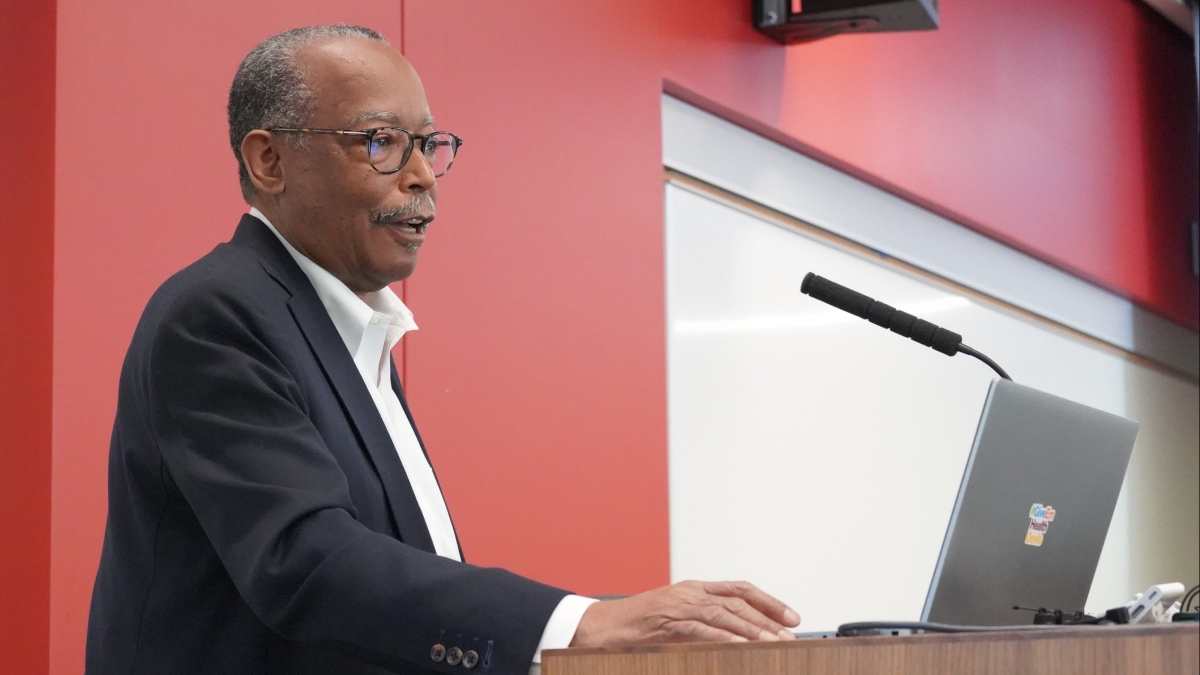College of Health Solutions hosts visit from leading expert in genomic research

Vence Bonham, acting deputy director of the National Human Genome Research Institute, spoke at Arizona State University on March 21 about the latest developments in sickle cell disease treatment. Photo by Keri Hensley/ASU
Some fortunate Arizona State University faculty, staff and students were able to gain valuable insights and perspective during a visit by one of the country’s leading figures in health and scientific research: Vence Bonham.
Bonham is the acting deputy director of the National Human Genome Research Institute (NHGRI). He was in town for a visit hosted by the College of Health Solutions with help from ASU Health and Knowledge Enterprise. The visit included stops on the Downtown Phoenix and Tempe campuses.
In addition to his role as acting deputy director, Bonham leads the institute’s health equity and workforce diversity programs and works with others throughout the National Institutes of Health (NIH) to promote the mission of the organization.
According to his NHGRI biography, his research focuses on the social implications of new genomic knowledge, particularly in communities of color and how genomics influences the use of constructs of race and ethnicity in biomedical research and clinical care, and the role of genomics in health inequities. The Bonham group also studies sickle cell disease.
Part of his March 21–22 visit was devoted to discussing some of the latest advances in treatment of sickle cell disease with faculty, staff and students in a talk at ASU’s Center for Law, Science and Innovation and the Center for Public Health Law and Policy, both housed in the Sandra Day O'Connor College of Law.
His presentation outlined the history of the disease and how it has been treated in Western medicine and included a look at some promising new gene therapy treatments.
Bonham said he was happy to have a chance to share news of the latest research developments in the field with ASU students and faculty at the invitation of College of Health Solutions Vice Dean Michael Yudell.
Yudell said with the emergence of ASU Health and the opportunities that would present, that it would be beneficial to get the perspective of someone like Bonham.
“I thought it would be a fantastic opportunity to hear from a leader at (the National Institutes of Health) and help us learn more about opportunities there,” Yudell said.
Bonham said he frequently made such trips prior to the pandemic and particularly enjoyed the chance to interact with students.
“I’m happy to be back out talking to students,” Bonham said. “In one of my roles at the National Human Genome Research Institute, I direct our Training, Diversity and Health Equity Office, which includes our extramural training programs. I have the opportunity to work with my colleagues to support postdoctoral fellows, graduate students and other trainees. Interacting with and supporting them is a part of my work I really enjoy.”
Before his presentation at the law school, Bonham had a chance to speak with students during an informal breakfast discussion.
At one point he advised the students to pick work they could be passionate about.
“I always tell students that their passion should be a part of their decision-making about their career,” Bonham said. “Because there are so many exciting things happening in biomedical research and science, finding your passion will help in your success in the field.”
Jordan Fakhoury, a student majoring in medical studies, said he truly appreciated the opportunity to meet with someone of Bonham’s stature.
“I was humbled to be in a meeting with him and the valuable information he shared,” Fakhoury said. “When you consider his resume and what he’s done, that’s a valuable experience.”
Alexis Blasko, a health sciences major, said the meeting offered a welcome perspective from a fresh voice.
“I was hoping for a casual, open conversation, but I gained much more than that,” Blasko said. “We gained knowledge of some research opportunities that can be hard to come by at NIH. I think there is an opportunity now for further connection and development for students, maybe a new perspective in a new field of research.”
More Health and medicine

Making medicine side-effect free
Many drugs that address medical conditions can come with serious side effects. In drug commercials, the litany of potential side effects is often longer than the benefits being touted. Carl…

Diagnostic research happening at ASU focused on detecting diseases earlier to save lives
It was one of America’s founding fathers, Benjamin Franklin, who may have foreshadowed today’s health care innovation when he quipped the adage: An ounce of prevention is worth a pound of cure.In…

Fighting the fungus among us
It starts with a spore.When inhaled, spores of the coccidioides fungus can cause coccidioidomycosis — better known as valley fever. The spores may be fungi, but they are no fun.Valley fever usually…

